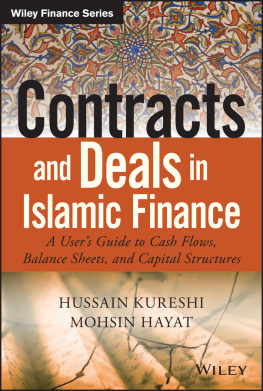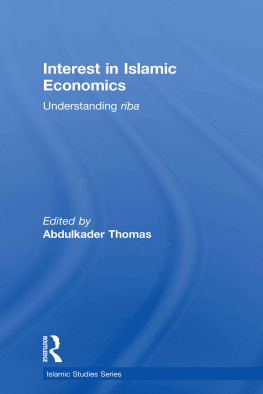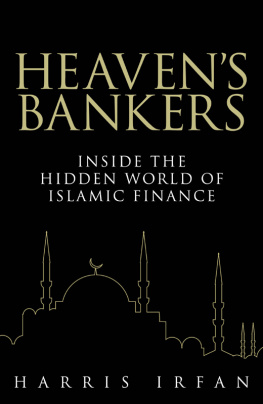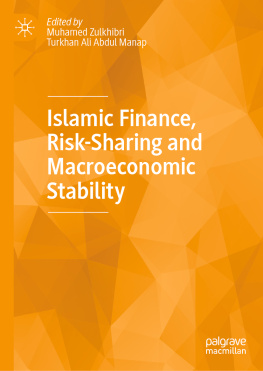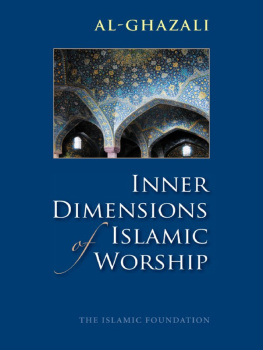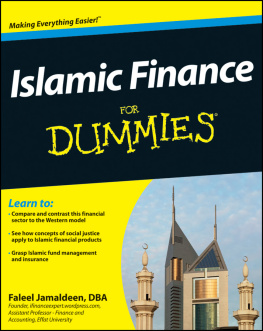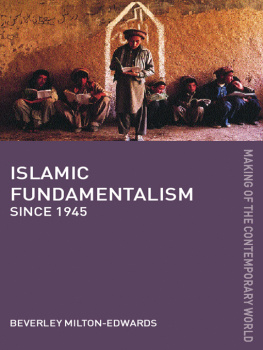Choudhury - Islamic Financial Economy and Islamic Banking
Here you can read online Choudhury - Islamic Financial Economy and Islamic Banking full text of the book (entire story) in english for free. Download pdf and epub, get meaning, cover and reviews about this ebook. publisher: Taylor & Francis (CAM), genre: Romance novel. Description of the work, (preface) as well as reviews are available. Best literature library LitArk.com created for fans of good reading and offers a wide selection of genres:
Romance novel
Science fiction
Adventure
Detective
Science
History
Home and family
Prose
Art
Politics
Computer
Non-fiction
Religion
Business
Children
Humor
Choose a favorite category and find really read worthwhile books. Enjoy immersion in the world of imagination, feel the emotions of the characters or learn something new for yourself, make an fascinating discovery.

- Book:Islamic Financial Economy and Islamic Banking
- Author:
- Publisher:Taylor & Francis (CAM)
- Genre:
- Rating:5 / 5
- Favourites:Add to favourites
- Your mark:
- 100
- 1
- 2
- 3
- 4
- 5
Islamic Financial Economy and Islamic Banking: summary, description and annotation
We offer to read an annotation, description, summary or preface (depends on what the author of the book "Islamic Financial Economy and Islamic Banking" wrote himself). If you haven't found the necessary information about the book — write in the comments, we will try to find it.
Choudhury: author's other books
Who wrote Islamic Financial Economy and Islamic Banking? Find out the surname, the name of the author of the book and a list of all author's works by series.
Islamic Financial Economy and Islamic Banking — read online for free the complete book (whole text) full work
Below is the text of the book, divided by pages. System saving the place of the last page read, allows you to conveniently read the book "Islamic Financial Economy and Islamic Banking" online for free, without having to search again every time where you left off. Put a bookmark, and you can go to the page where you finished reading at any time.
Font size:
Interval:
Bookmark:

Islamic Financial Economy and Islamic Banking
Islamic Financial Economy and Islamic Bankingis a thorough, deeply conceptual, analytical and applied work in the epistemological foundation of the Islamic world-system.
The book provides an original contribution to the generalized-system model of shariah. The model, derived from the Quran and Sunnah (Prophetic guidance) incorporates wide, analytical coverage of the purpose and objective of the Islamic worldview (maqasid as-shariah) in Islamic economics and finance in particular.
The author covers issues that contrast with the existing understanding of Islamic economics and finance, including some specific goals defining the field and how they compare in todays unstable world of financial volatility. A new heterodox thinking in economic theory is outlined.
Its presentation and analysis, methods and approach, overarch the fields of philosophy of science, rigorous analysis, mathematical and other presentations of the understanding given, and all taken up in the light of the exegesis of the Quran and coverage of the Sunnah. The result is substantive in the field of scholarship and application; and in analytically proving the universality and uniqueness of the epistemic worldview for the academic and practitioner world at large. The totality of the multiverse diversity of issues and problems reviewed comprise the study of the world-system by the Tawhidi methodological approach. Yet this methodology and its empirical configuration are universally applicable to all users without any need for unnecessary religious overtones.
Dr Masudul Alam Choudhury is Professor and International Chair of the Postgraduate Program in Islamic Economics and Finance, Faculty of Economics, Trisakti University, Jakarta, Indonesia. He is a Visiting Professor at the Social Economy Center, Ontario Institute for Studies in Education, University of Toronto.
Professor Choudhury is the pioneer in the field of the epistemological treatment of Islamic Economics and Finance over the past 35 years by way of his original works in this area.
He is the Editor-in-Chief of the SCOPUS-listed and Australian ABDC JEL-catalogued journal HIJSE (Humanomics: International Journal of Systems & Ethics) currently in its 33rd year of publication. His works have been reviewed by the Times Higher Education Supplement, Economic Journal, Southern Economic Journal, Middle East Review and Journal of Economic Literature.
Islamic Business and Finance Series
Series Editor:
M. Ishaq Bhatti, La Trobe University, Australia
There is an increasing need for western politicians, financiers, bankers, and indeed the western business community in general, to have access to high quality and authoritative texts on Islamic financial and business practices. Drawing on expertise from across the Islamic world, this new series will provide carefully chosen and focused monographs and collections, each authored/edited by an expert in their respective field, from all over the world.
The series will be pitched at a level to appeal to middle and senior management in both the western and Islamic business communities. For managers with a western or Islamic background, the series will provide detailed and up-to-date briefings on important topics; for academics, postgraduates and business communities, the series will provide a guide to best practice in business in Islamic communities around the world, including Muslim minorities in the west and majorities in the rest of the world.
1. God-Conscious Organization and the Islamic Social Economy
Masudul Alam Choudhury
Islamic Financial Economy and Islamic Banking
Masudul Alam Choudhury

First published 2016
by Routledge
2 Park Square, Milton Park, Abingdon, Oxon OX14 4RN
and by Routledge
711 Third Avenue, New York, NY 10017
Routledge is an imprint of the Taylor & Francis Group, an informa business
2016 selection and editorial matter, Masudul Alam Choudhury; individual chapters, the contributors
The right of Masudul Alam Choudhury to be identified as the author of the editorial material, and of the authors for their individual chapters, has been asserted in accordance with sections 77 and 78 of the Copyright, Designs and Patents Act 1988.
All rights reserved. No part of this book may be reprinted or reproduced or utilized in any form or by any electronic, mechanical, or other means, now known or hereafter invented, including photocopying and recording, or in any information storage or retrieval system, without permission in writing from the publishers.
Trademark notice: Product or corporate names may be trademarks or registered trademarks, and are used only for identification and explanation without intent to infringe.
British Library Cataloguing in Publication Data
A catalogue record for this book is available from the British Library
Library of Congress Cataloguing in Publication Data
A catalog record for this book has been requested
ISBN: 9781472438775 (hbk)
ISBN: 9781315590011 (ebk)
Typeset in Sabon
by Out of House Publishing
Contents
Mustafa Omar Mohamed and Fau ziah Mohamad Taib
Masudul Alam Choudhury and Kabir Hasan
Statistical Appendix: Data on Critical Financial Crisis Indicators
Isharaf Hosain and Masudul Alam Choudhury
My thanks are to those who have contributed to this rare title in the field of scholarly and analytical exposition of Islamic financial economics an area that has not been attended by Islamic economic and finance writers. My thanks to Gower for the early contract that enabled me to start and complete this work on time. My time as visiting professor in the Social Economy Center in the Ontario Institute for Studies in Education, University of Toronto between August and December 2014 has been instrumental in completing this work. The epistemological content and its applications were presented in 23 lectures delivered university-wide at the Institute of Islamic Banking and Finance while I was Professorial Chair in Islamic Banking and Finance, International Islamic University Malaysia between February and August 2014.
The subject of a critique of financial engineering in view of Islamic financial economics was opened up by my paper, Islamic Critique and Alternative to Financial Engineering Issues, King Abdulaziz University Journal Islamic Economics, 22:2, 2009. In the present volume, an approach that is substantially Islamic in its epistemological foundation was carried further into the field of financial economics. Such an approach has not been undertaken by many others, including the so-called gurus of Islamic economics and finance, who wandered in the axioms and theories of rationalism. The result of such meaningless pursuits was a complete misrepresentation of the Tawhidi (oneness of God = unity of knowledge) methodological worldview, specific to the epistemological approach and its application to Islamic financial economics. The result has been a complete misrepresentation of Islamic economics, banking. The starkest outcome is the rampant legitimation of secondary financing instruments and a misunderstanding of primary Islamic financing instruments in terms of shariah-compliance while abandoning the sublime field of maqasid as-shariah (purpose and objective of the shariah). Paradoxically, this situation is true even in respect of a comparative study of Islamic financial economics and banking with contemporaneous theories and applications. Our work here challenges and criticizes this kind of an approach as being without any methodological substance. This work presents the epistemological approach of
Font size:
Interval:
Bookmark:
Similar books «Islamic Financial Economy and Islamic Banking»
Look at similar books to Islamic Financial Economy and Islamic Banking. We have selected literature similar in name and meaning in the hope of providing readers with more options to find new, interesting, not yet read works.
Discussion, reviews of the book Islamic Financial Economy and Islamic Banking and just readers' own opinions. Leave your comments, write what you think about the work, its meaning or the main characters. Specify what exactly you liked and what you didn't like, and why you think so.



